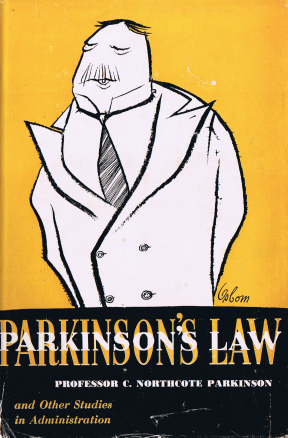
“Work expands so as to fill the time available for its completion”. It is an insightful statement. It has been scientifically proven and it is still quoted in many manuals, best-selling books, and newspapers. But most importantly, this is just the beginning of the compelling book we are reviewing today.
I am talking about Parkinson’s Law and Other Studies in Administration by Cyril Northcote Parkinson. Published in 1957, it is a collection of ten satirical essays previously written for The Economist and other magazines. Professor Parkinson was a doctor in History, a British army staff officer before and during WWII, and a researcher for different universities and institutions. Based on his experience and with plenty of sarcasm, he comments on topics such as staff recruitment, organizational culture, or efficiency in the workplace. Because these topics are so current, Parkinson’s Law is still quoted and can be quite enlightening for today’s reader.
The book is not serious, but neither is it trivial. He describes exaggerated realities that will make you laugh. But from each of them, he makes an insightful analysis that will force you to pause and think. In his second essay, for instance, he discusses decision-making through voting, a key process in almost any organization: from a small business to the House of Commons. He describes most meetings and debates as having a high proportion of senile, lazy, deaf, and hungover members within them. Absent minded as they may be, they are the easiest to manipulate to your advantage. Bear in mind, though, that this will never be achieved through reasoned speeches, which they most certainly won’t understand. Their vote will probably simply follow the example of others. Therefore, your effort should be focused on convincing them that everybody will vote whatever you advocate for. Achieve that and will gain a supporter. This might be an exaggerated picture, but he makes a point by stressing the importance of social conformity in voting processes. This is a claim few social psychologists would argue against, and crucial when understanding government and corporate decisions. With a similar routine, he proceeds to examine the recruitment procedure or the age of retirement. In most cases, these observations will be a source of both entertainment and wisdom.
Professor Parkinson has an empirical mindset and so acknowledges the lack of scientific support for his claims. But paraphrasing him: unproved as these theories may be, they seem worthy of careful investigation. And indeed investigation came. Psychology scholars decided to test the fundamental remark of the book’s first essay, also entitled Parkinson’s Law. This is the observation I quoted in the introduction, which reads “Work expands so as to fill the time available for its completion”. Researchers showed that given one same task, the time participants spent on it was proportionate to the time available. And in line with Parkinson’s remarks, this increased time did not involve any improvement in performance. It has been replicated and gained fame over the years, becoming part of the mainstream vocabulary. But for some reason, this lasting interest didn’t extend to the rest of the book. Parkinson’s book is full of insightful observations, why should we only research one?
As I said, this is not a university textbook. Reading Parkinson’s Law is as delightful as it gets. It is not for nothing that many of these short essays were previously published in The Economist. The magazine is known for a clear and effective style and Prof. Parkinson delivers exactly that. But most importantly, the book is very funny. If you enjoy merciless sarcasm, I can assure you will laugh out loud. Did you know mathematical formulas could be hilarious?
Finally, it must be mentioned that although its wisdom has persisted, the book itself has not been republished. You have two quick ways to read the book: search for Parkinson’s Law pdf in Google or rent it digitally in the website Internet Archive. Either way, reading it will prove inspirational and enjoyable.
Parkinson’s Law and Other Studies in Administration can be found online in PDF at no cost on Google Scholar.

“Work expands so as to fill the time available for its completion”. It is an insightful statement. It has been scientifically proven and it is still quoted in many manuals, best-selling books, and newspapers. But most importantly, this is just the beginning of the compelling book we are reviewing today.
I am talking about Parkinson’s Law and Other Studies in Administration by Cyril Northcote Parkinson. Published in 1957, it is a collection of ten satirical essays previously written for The Economist and other magazines. Professor Parkinson was a doctor in History, a British army staff officer before and during WWII, and a researcher for different universities and institutions. Based on his experience and with plenty of sarcasm, he comments on topics such as staff recruitment, organizational culture, or efficiency in the workplace. Because these topics are so current, Parkinson’s Law is still quoted and can be quite enlightening for today’s reader.
The book is not serious, but neither is it trivial. He describes exaggerated realities that will make you laugh. But from each of them, he makes an insightful analysis that will force you to pause and think. In his second essay, for instance, he discusses decision-making through voting, a key process in almost any organization: from a small business to the House of Commons. He describes most meetings and debates as having a high proportion of senile, lazy, deaf, and hungover members within them. Absent minded as they may be, they are the easiest to manipulate to your advantage. Bear in mind, though, that this will never be achieved through reasoned speeches, which they most certainly won’t understand. Their vote will probably simply follow the example of others. Therefore, your effort should be focused on convincing them that everybody will vote whatever you advocate for. Achieve that and will gain a supporter. This might be an exaggerated picture, but he makes a point by stressing the importance of social conformity in voting processes. This is a claim few social psychologists would argue against, and crucial when understanding government and corporate decisions. With a similar routine, he proceeds to examine the recruitment procedure or the age of retirement. In most cases, these observations will be a source of both entertainment and wisdom.
Professor Parkinson has an empirical mindset and so acknowledges the lack of scientific support for his claims. But paraphrasing him: unproved as these theories may be, they seem worthy of careful investigation. And indeed investigation came. Psychology scholars decided to test the fundamental remark of the book’s first essay, also entitled Parkinson’s Law. This is the observation I quoted in the introduction, which reads “Work expands so as to fill the time available for its completion”. Researchers showed that given one same task, the time participants spent on it was proportionate to the time available. And in line with Parkinson’s remarks, this increased time did not involve any improvement in performance. It has been replicated and gained fame over the years, becoming part of the mainstream vocabulary. But for some reason, this lasting interest didn’t extend to the rest of the book. Parkinson’s book is full of insightful observations, why should we only research one?
As I said, this is not a university textbook. Reading Parkinson’s Law is as delightful as it gets. It is not for nothing that many of these short essays were previously published in The Economist. The magazine is known for a clear and effective style and Prof. Parkinson delivers exactly that. But most importantly, the book is very funny. If you enjoy merciless sarcasm, I can assure you will laugh out loud. Did you know mathematical formulas could be hilarious?
Finally, it must be mentioned that although its wisdom has persisted, the book itself has not been republished. You have two quick ways to read the book: search for Parkinson’s Law pdf in Google or rent it digitally in the website Internet Archive. Either way, reading it will prove inspirational and enjoyable.
Parkinson’s Law and Other Studies in Administration can be found online in PDF at no cost on Google Scholar.




